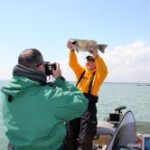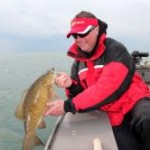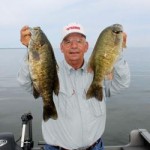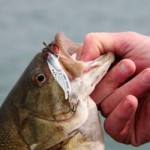By Abe Smith
from The Fishing Wire
If you’re seeking a smallmouth worth photographing, now is the time to head to the Great Lakes.
Great Lakes smallmouth bass provide some of the hottest bass action of the year during the fall. As their name implies, the challenge on these waters derives from their magnitude. Fish have plenty of room to roam from Duluth to the St. Lawrence River, and “roaming” is part of a smallmouth’s daily life. Here are three great Great Lakes fishing spots and how to catch them.
Lake Erie and Niagara River (Buffalo, Niagara, and Lewiston, N.Y.)
“In fall, it’s all about bait,” says Frank Campbell, a guide with Niagara Region Charter Service.
Campbell is considered by many to be the “dean” of an illustrious school of smallmouth guides on the Eastern Basin of Lake Erie and the Niagara River near Buffalo, New York. He says that smallmouth are looking for the quickest way to bulk up for winter and follow baitfish migrations and eat everything they find, from gobies to crayfish to sculpin to emerald shiners…anything that brings protein to their diet.
“If you’re marking baitfish, you’re in the right areas because the fish will find them,” he said.
The fall transition begins as water temperatures tumble into the low 60s. Campbell relies on his electronics to identify “balls of bait coming together…and lots of lasagne-type marks.” The baitfish concentrations position more and more near bottom as fall progresses.
Smallmouth can be active and aggressive while they are bulking up for winter, and Campbell matches their mood with active presentations, often employing a jigging spoon — the Cotton Cordell C.C. Spoon — and the Heddon Sonar, a “tried and true” vibrating blade bait.
Whopper smallmouth like this one are not hard to find in the cold, clear waters of the big lakes–but it takes a bit of know-how to get on the right spots.“You can also work a YUM 2ube or a dropshot with a variety of soft plastics,” Campbell said. “But it’s easier to ‘spoon’ or ‘blade’ them when they’re active and suspended a little off the bottom. You can zoom it through their zone on the upswing and drop it back through again for the reaction bite. The fish can get very competitive. They figure they need to get to the bait first or another bass will.”
Lake St. Clair (Michigan/Ontario)
It’s a shallower bite for smallmouth in early to mid-fall on Lake St. Clair, home waters of Gerry Gostenik at Great Lakes Bass Fishing Guide Service. Smallmouth migrate toward the Canadian shore of St. Clair throughout the summer and concentrate near patches of vegetation on the flats.
Lipless crankbaits can be critical search tools.
“The XCalibur Xr50 Rattle Bait is one of my best search baits, and it is great when you find them, too,” says Gostenik who favors the Citrus Shad and Ghost colors in the Xr line. “On St. Clair — and the Great Lakes in general during fall — you can work a lot of water before you find a pack of them but then get into a bunch in a hurry. On St. Clair and Erie, smallmouth eat a lot of shad at this time of year, and the size of the Xr 50 is almost the perfect match.”
The XCalibur Xr series comes in three sizes and in low resonance One Knocker (Xrk) options. Their weight and density enable long casts, which can be important on the often ultra-clear and expansive waters of the Great Lakes.
A double-header of high-quality brown bass–expert guides say find the bait and you’ll find the bass.Gostenik starts with a steady retrieve, but often alters retrieve speed and cadence if a simple moderate retrieve fails to produce.
“Let the fish tell you what they want,” he advises. “When you get a bite, pay attention to what you were doing.”
And don’t overlook swimbaits, a more-subtle search bait option in the fall.
“A Yum Money Minnow with a belly-weighted hook can be good, too, when fish are schooling in fall and feeding on shad,” Gostenik said. “I’m fishing it shallow in situations where the fish are schooling and birds are diving…smallmouth will kill that bait! Fall is one of the best times of year to be out here.”
Lake Michigan/Green Bay (Door County, Wisconsin)
Early fall finds smallmouth in transition in the picturesque waters of Lake Michigan and Green Bay in northern Door County, Wisconsin.
Guide Jimmy Doering of Cast n’ Catch Charters guides anglers to bass near his Washington Island home and the waters of the upper peninsula, including Sister Bay, Ellison Bay and Rowleys Bay.
His early season strategy is to straddle classic late summer and fall smallmouth locations.
“In late September I like to start in 3 to 5 feet of water and slowly move out,” he said. “Later in October and November, you can head straight to the bluffs. But you can still whack schools of 3-pounders in 4- to 8-feet of water in fall, especially if it is sunny and warm.”
Deep running lures like the Sonar are among the favorites for connecting with fall smallmouth.Doering’s bread-and-butter baits in early fall are the Yum 2ube and slightly larger (4.25-inch) Yum Vibra-King Tube fished on 1/8- to ¼-ounce jigheads. Jighead size will vary with depth and wind velocity. He backs up that presentation with a wacky-rigged Yum Dinger.
“I usually fish the Dinger weightless in summer and the early transition period, but I weight them to fish 15 or 20 feet of water and they still wiggle and shimmy,” he says. “I often recommend one guy throwing a tube and the other a wacky Dinger to see which one is producing more fish that day.”
Fish school by size and age in fall, and an angler who finds schools of 3- or 4-pounders will do well to stay with these “wolf packs” whether he finds them shallow or deep.
By late fall, bass settle into their classic cold water locations along the bluffs. These post card emblems of the Door County region are sheer rock walls that drop quickly to depths of 15-, 30- and even 40-plus feet. They can be late fall bass magnets, and they often yield the biggest fish of the season.
“Up here we find certain key bluffs that the fish seem to live on,” says Doering. “We still see them spitting up gobies and crayfish, but a lot of bass are feeding on baitfish high in the water column. We catch them on and Smithwick Rogue jerkbaits only about 4-feet down along 30-foot-deep bluffs.
“But, baitfish are the key. Fish are like us. Their mindset is food…now!”
Contacts:
Frank Campbell, www.niagaracharter.com; 716-523-0013
Gerry Gostenik, www.greatlakesbassfishing.com; 313-319-0100
Jimmy Doering, www.castncatchcharters@gmail.com; 920-535-3474



